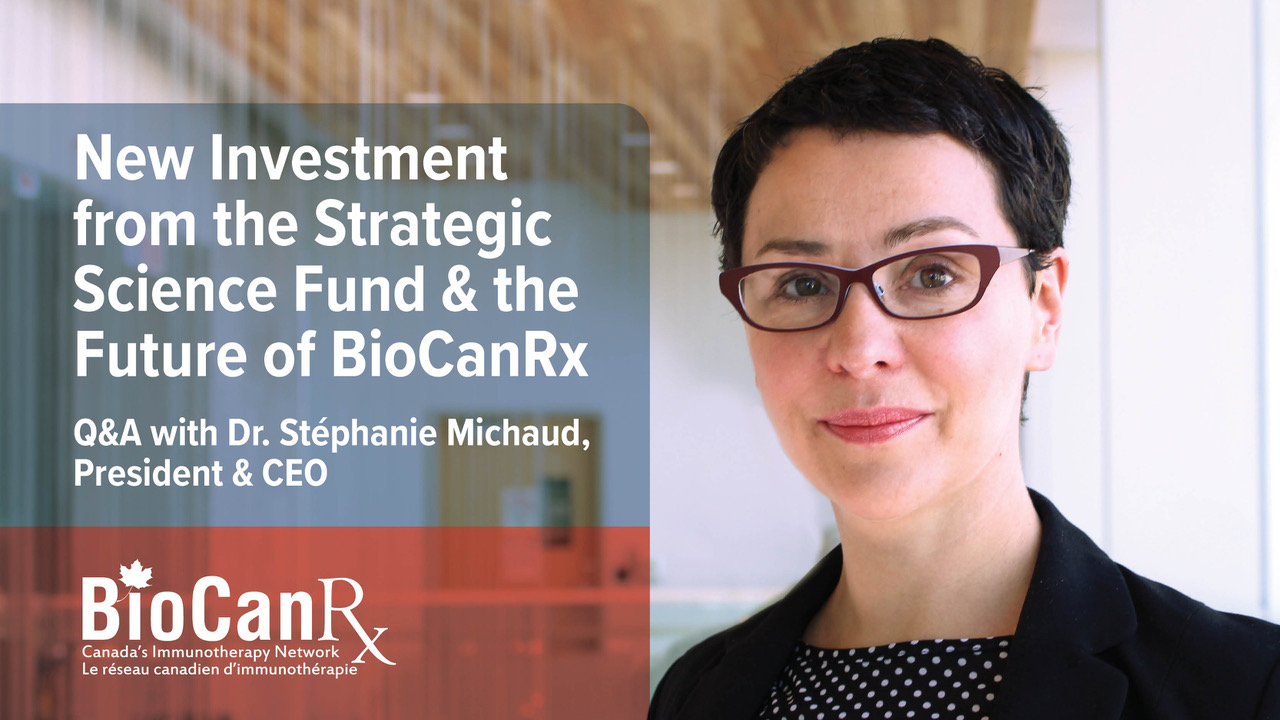
This past December, the Government of Canada announced support for 24 third-party science and research organizations – including BioCanRx – under the new Strategic Science Fund (SSF). We asked Dr. Michaud about the importance of this critical funding and what it means for the future work of BioCanRx – Canada’s Immunotherapy Network.
What does this new federal investment mean for the BioCanRx network?
This federal investment is a lifeline to BioCanRx. Without this investment in BioCanRx and its mission, we were to close our doors on March 31, 2024. With this new federal investment, BioCanRx will continue to advance innovative immunotherapies to the clinic and increase the number of clinical trials available to Canadian patients.
One of BioCanRx’s most significant accomplishments to date is the establishment of made-in-Canada CAR T cell therapy and the development of Canadian-Led Immunotherapies in Cancer (CLIC) with its partners — what do you see on the horizon for the CLIC program?
On the horizon for the CLIC program is the availability of novel products to a greater number of clinical sites, across Canada. This is in line with our previously stated mission statement of increasing access to these types of therapies, to an even greater number of Canadian cancer patients.
What other research will this funding allow you to continue to grow in your project pipeline? Will you be investing in new areas of translational immunotherapy research?
This funding will enable us to continue the translation of products already in our pipeline and enable us to onboard new products that are able to modulate the immune system and fight cancer. Canadian researchers are top notch – there is no doubt in my mind that we will be investing in new areas of translational immunotherapy research!
What difference do you hope BioCanRx can make in the lives of Canadian cancer patients?
We hope to increase the number of trials, based on innovative therapies and novel approaches of targeting cancer, to an even greater number of patients in Canada. That is one of the important parts. Canadian patients can and should benefit from early investments in research. Clinical trials are a way to do this.
Tell us about other network activities that will benefit from this funding.
BioCanRx takes an ecosystem approach to making this translational engine we have built work as efficiently as possible. This entails the evaluation of all of the inputs and ecosystem players to keep this engine running smoothly – at BioCanRx, this includes training in translation and also, biomanufacturing. We also could not do any of the work that we do without our patient group partners and patients themselves. We expect to further align their efforts to our translational research program.
How will BioCanRx work with industry partners moving forward?
Canada has some very exciting life science companies carrying out cutting-edge research. We have supported nascent ideas that have grown to become thriving SMEs. We will continue to work alongside industry partners, large and small, that are aligned to the BioCanRx mission: to accelerate the development of immunotherapies to the clinic for the benefit of patients.
Overall, what changes do you hope to see coming in cancer immunotherapy research in Canada?
I hope to see far more made-in-Canada products as successfully funded projects in the BioCanRx pipeline and clinical trial program but also that of CIHR in the Clinical Trial Fund, an initiative of the Government of Canada’s Biomanufacturing and Life Science Strategy. I hope that we can support translational research in Canada to see the outputs of our early stage investments as clinical trials and new companies. The metric that matters most to the BioCanRx team, and dare I say network, is the number of patients treated. And I hope that in the next decades, we can turn that into number of patients cured.

